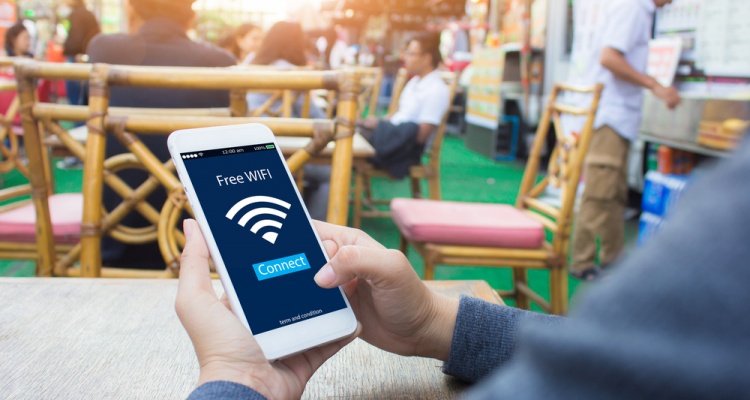Cyber Crime
Travel Much? Here Is How You Can Protect Your Data When Accessing Unfamiliar Wi-Fi During Vacations

If you travel frequently and find yourself in different places several times a year, you should be aware of how to protect your data. When you’re not connected to your home network, accessing unfamiliar Wi-Fi hotspots, or visiting new places, you need to be extra cautious.
This is because being in an unfamiliar location, you may be exposed to data thieves and hackers. So, to help protect yourself, here are some things to think about before going on vacation.
1. Exercise Caution When Using Public Wi-Fi
When using free public Wi-Fi that isn’t password-protected, be cautious. When you connect to this network, your device sends data without encryption over that network.
That means that anyone with the necessary skills can easily read and track the data that travels between your PC and the wireless router. As a result, we advise you to use a secure network or to invest in data roaming. Instead, if you really want to stay connected, you should rent a Wi-Fi hotspot. They are usually available for travellers in international airports.
If you must connect to an unsecured Wi-Fi network, however, use a VPN instead. Because VPNs include encryption, even if someone reads the information you transmit, it will still come out as gibberish.
ALSO READ: Kedarnath, Maa Vaishno Devi Helicopter Booking Scam: Cyber Fraud Using Google Ads In Name Of Gods
2. Keep your device safe
Theft of your devices poses a significant risk to your cybersecurity. Sensitive information is typically stored on your computer, tablet, smartphone, and even your smartwatch. You may have saved your personal and banking information, hotels and travel plans, and other information on there.
It is best to keep your devices close to you or in your hotel room at all times. You should also exercise caution when visiting tourist hotspots, as criminals are known to prey on tourists. Before going anywhere, do your research to learn about the scams to avoid. And, unless absolutely necessary, avoid using your devices in unsecured public places.
3. Disable the auto-connect option
If your connection is established to a Wi-Fi network, it will usually reconnect to that same network if it is nearby in the future. However, you should disable this feature when using public Wi-Fi. You want to have complete control over the network you’re using. As a result, when you use your devices, you can be confident that your data is secure.
This is especially true if you’ve purchased a local prepaid sim card for short-term use. Because you won’t be able to use the sim card when you return home, there’s no reason to limit your data usage. Furthermore, data connections are more secure by definition than unsecured networks.
ALSO READ: On Sale: Fake Vaccination Certificate On Telegram – Check Point Research
4. Install antivirus
Everyone should have antivirus software installed on all of their devices at all times. Their computer, tablet, and smartphone are all included. Yes, Android and iOS require security suites as well. However, if you are a frequent flyer, having this protection is even more important.
You’re bound to connect to different networks if you travel a lot and, while most Wi-Fi systems have built-in security, you may come across an unsecured connection that compromises your system.
Your last line of defence is an antivirus or security suite installed on your devices. So, even if you connect to an infected network inadvertently, you can still protect your devices from malware.
5. Always use the most recent version of the operating system
This is something that all users must do on a regular basis, but it is especially important for travellers. Security experts and cybercriminals are constantly engaged in a high-tech cat-and-mouse game. Before the latter exploits a security flaw, the former actively searches for and plugs it.
The compelling reason why travellers are most vulnerable is that some hackers only target specific geographical areas. Some do this to avoid scrutiny from the larger security community, while others do it to pursue a local geopolitical goal.
The ILOVEYOU bug, which spread throughout the world in 2000, was one example of this. While it eventually infected computers worldwide, it initially only targeted victims in Metro Manila. The same can be said for the Magniber ransomware, which was discovered in South Korea.
6. Backing up is crucial
Even if you try to protect your devices as much as possible, there may be times when you lose them. While the cost of losing a smartphone or laptop can be high, the data contained within them is usually more critical.
And, while attempting to restore data at home can be difficult enough, doing so in a foreign country is ten times more difficult.
That is why, before you travel, you should back up your data. Your work and other important files should always be stored on a network-attached storage system or in the cloud. That way, you’ll always have a backup.
If you have important documents on your phone, such as airline tickets, hotel reservations, and so on, then keep a hard copy with you too.
7. You must avoid Public Computers
Many hotels have public computers that you can use. While these may appear to be convenient, they should only be used in an emergency. After you’ve used them, change your account passwords with another device, such as your smartphone.
You don’t know who handled these computers, what safeguards they have if they’re infected with malware, or if physical tracking devices, such as keyloggers, are attached to them.
Credentials can be stolen in this manner, allowing malicious hackers to access your account information even when you are at home.
Follow The420.in on
Telegram | Facebook | Twitter | LinkedIn | Instagram | YouTube
